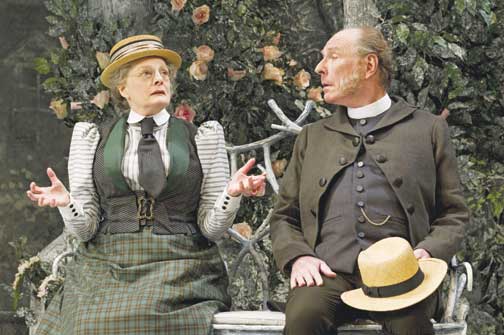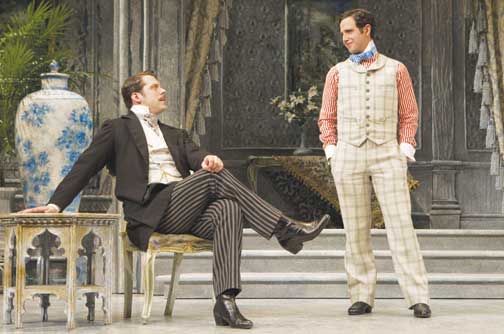


SERVICES
Tuesday January 18, 2011
The Importance Of Being Ernest
Dana Ivey and Paxton Whitehead in Roundabout Theatre Company's production of 'The Importance of Being Ernest' (Joan Marcus) By Gwen Orel Oscar Wilde, like Shaw and Sheridan, was an Irishman in London. Like Irish traditional music, which is modal (neither major nor minor in key); Wilde's work is neither one nor the other thing. It's both-mocking and sweet; sentimental and sharp. The celebrated West End playwright was also the author of the Christian fairytale "The Selfish Giant." His mother was the patriot Speranza (she also collected Irish folklore). Wilde's famous paradoxical humor hits in the space after the words - the breath after, as you realize the words aren't what you expected. It's the delivery more than the thought that makes them shine; it's literature as a kind of talk. Wilde's talk supposedly outshone his writing (a very Irish trait). A really good production of The Importance of Being Earnest, Wilde's celebrated 1895 play, should reveal Wilde at his most glorious - and most Irish. Roundabout's new production does not. Brian Bedford is the reason to see the show running the American Airlines Theatre. His Lady Bracknell combines righteous indignation with injured incomprehension into a perfect confection of a Victorian grande dame. He doesn't play it as a man in drag; he just plays the role. When Bracknell's voice drops an octave in "I beg your pardon," it's both hilarious and imposing. Bedford understands Wilde's style perfectly: discovering one's potential son-in-law was bred in a handbag is no laughing matter. It is, of course, but only if you're the audience looking in. Unfortunately and mysteriously, Bedford has not communicated this style to his cast. In the grand tradition of actor-managers, Bedford not only stars but also directs Wilde's comedy of mistaken identities and bad manners. But where Bedford conveys Wilde's Irish humor that relies on deadpan delivery and speed, his cast often indicate and mug. They charm in bursts; watching the play induces a kind of motion sickness. Only Dana Ivey as Miss Prism and Paxton Whitehead as Rev. Canon Chasuble match Bedford's grave hilarity. The play shows off Wilde's fancy at its silliest and sweetest. In the play, two sets of young people engage in innocent delusions and dreams of romance. One of the most enduring sillinesses of the plot involves the name Earnest - coincidentally, the two young heroines in the play have always wanted to love a man by that name. One of the men has always called himself that, but we learn it is not his name; the other takes on the invented identity too. Algernon (Santino Fontana) induces the friend he knows as Earnest (David Furr) to reveal that Earnest is not his name by revealing that he holds his cigarette case, inscribed to Uncle Jack. When his friend admits that he's Jack in the country and Earnest in town - he had invented a wicked brother Earnest in order to get away from the boredom of country life, where he is guardian to Cecily Cardew (Charlotte Parry) - Algernon accuses him of being a "secret Bunburyist." Bunbury is the name of the invalid Algernon has invented to have an excuse to go into the country, and escape the boredom of dinner with relatives like Lady Bracknell. Jack needs Algernon's good will, however, as he hopes to marry Lady Bracknell's daughter Gwendolen (Sara Topham). Much has been made over the years of Wilde's closeted life as a homosexual and the device of Bunbury, and secret identities in general, but it really makes more sense to see Bunburying as Wilde's send-up of the theatricality of Victorian life in general. It's a society involving constant role-playing - whether it's Algernon playing at being a good nephew to his Aunt, and arranging the music for her evening parties, or Gwendolen and Cecily playing their roles as devoted friends turned rivals turned friends again, or even Miss Prism, Cecily's imposing governess, performing her duties as a very proper tutor.
David Furr and Santino Fontana (Joan Marcus) All of them long to perform in other roles - whether it's Algernon posing as the bad brother Earnest, in order to have an excuse to meet Cecily; Cecily writing in her diary about her engagement to Earnest, long before she's met him, or Gwendolen warning Jack/Earnest not to call her perfect, because it would leave no room for development - and she intends to develop in many directions. Proper Miss Prism has a backstory - she once wrote a three volume novel, which in Victorian lingo was code for torpid melodrama. A person is clearly more than his role. Even Jack doesn't know who his parents are, because old Mr. Cardew found him in a handbag in Victoria station - on the Brighton line. It's this lampooning of roles that also helps the play endure - after all, human society hasn't changed as much as all that. Wilde's most popular play is so commonly done that at times every other line rings the bell of recognizable quotation, not unlike watching Hamlet. "In married life, three is company, and two is none. When truths become facts, they lose all their intellectual value." While Bedford mostly avoids arch highlighting of the jokes, often the pace drags, particularly in Act One. Fontana has a nice sense of fun, but often steps on his own jokes by mugging. His wooing of Cecily feels the same as his impish mockery of his stuffy friend Jack. It's a difficult task Wilde sets to the actor to switch from foppish wit to sincere lover - but that's the task. (It's also the task of heroes and heroines in the Gilbert and Sullivan operettas, aided by Sullivan's soulful melodies). Similarly, Gwendolen must be adorable even while delivering her smug observations, or she seems shrill. Topham is shrill. Parry;s Cecily is pleasingly winsome but not quite clever enough. And Jack must be both pompous and lovable - he has, after all, chosen Algernon for a friend, and has creatively invented a wicked brother.
Desmond Heeley's sets are beautifully detailed - Algernon's fireplace holds an "aesthetic" fan - and I admired the Victorian style drop cloth too. But his costumes are uneven - Gwendolen's white dress for the town seemed wrong, as did her more citified country attire. But Bracknell is gorgeous, an upholstered dragon. Wilde said that there were two ways of disliking his plays, one was to dislike them, and the other was to prefer Earnest. His earlier melodramas blended redemptive love with satire and wit. Earnest needs to, also. You don't have to be Irish to get that - the best production I've ever seen was an Italian L'Importanza di Essere Ernesto. But it probably helps. |
CURRENT ISSUE

RECENT ISSUES


SYNDICATE
[What is this?]
POWERED BY

HOSTED BY

Terms of Service | Privacy Policy
Website Design By C3I







